Today’s #ForgottenFriday takes us back in time to life at Eden Camp before it was a museum.
The general feeling of those who remember life at Eden Camp during the Second World War is that, considering its nature, it was a very happy place. Indeed, the prisoners had a reasonable degree of comfort and an almost surprising amount of freedom.
Roll calls were carried out each night and morning when all the prisoners, except those on duty in hospital and cookhouse, were drawn up in ranks. Guards were posted on the hospital and cookhouse entrances to prevent movement while the count was made.
This operation, and much of the rest of the day-to-day organisation of the camp, was under direct authority of a sergeant who in turn reported to the orderly officer. However, the discipline and control of the prisoners was, in the first instance, the responsibility of their own N.C.O.s. The prisoners also provided many of their own services including a doctor, dentist, shoe repairer and tailor.
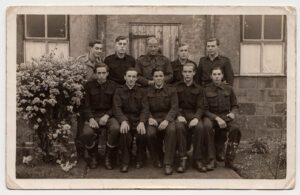
As time went by, the prisoners asked, and were granted permission, to convert the interior of one of the huts into a chapel and to construct a stage in the recreation hut.
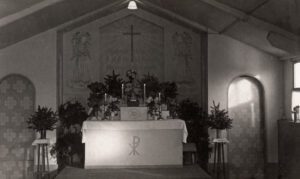
Here plays were performed, and the prisoner’s orchestra played to appreciative audiences made up not only of their fellow prisoners but also the British officers, their wives and invited locals. Later, they were allowed to perform in the Local Village Hall for the residents of Old Malton, and even produced refreshments (cakes and biscuits which they had made at the camp) during the interval. They even made some of their own instruments. Ex-prisoners have told us that at least one member had performed with the Berlin Philharmonic Orchestra.
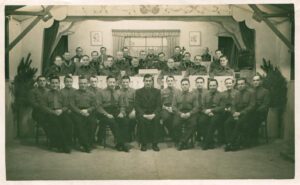
The majority of POWs were not Nazis but ordinary men conscripted into the German forces. Many had been tradesmen before the war and used their skills to produce an astonishing range of items with basic tools and raw materials. Woodcarving, metalwork, leatherwork, the writing of plays and pamphlets were only some of the activities undertaken to pass the time. Some of the specialist workers like tinsmiths, goldsmiths, artists and watch-repairers produced high quality work while more ordinary products included clothes brushes made from horsehair collected on the farms and sandals and slippers of rope. Some prisoners built small castles which were set up in the camp grounds..
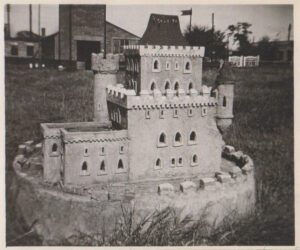
Camp money (identified by the Camp 250 Stamp) was paid to prisoners for the work that they undertook across the camp during and after the war. Although they could not spend it in the local shops of Malton in their free time, the Prisoners were able to utilise their money in the camp ‘shop’ to buy items like extra toiletries, writing materials, or food items which were not on ration.
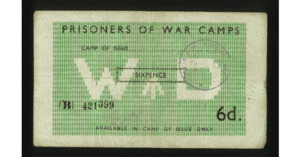
Many of the prisoners used to trade their camp money for Cigarettes and materials which were not in the camp shop to create arts and crafts.
Head to Eden Camp’s Digital Archive to find more interesting objects created by Prisoners of War within the camp during World War Two.


